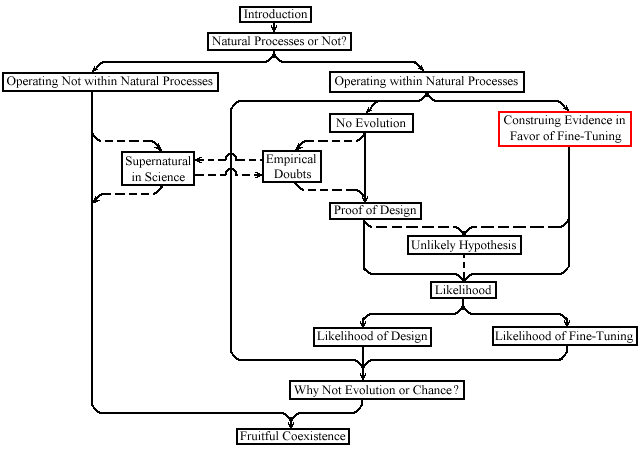

Construing Evidence In Favor of Fine-TuningYou believe that it is possible to construe what we see as evidence in favor of the hypothesis that god or an intelligent designer constructed the laws of nature in order to ensure that complex adaptations and intelligent life would exist. I will refer to this position as fine-tuning. Often it is pointed out by people who believe as you do that the physical constants of the universe must have been very close to what they are in order to produce what we see (intelligent life, complex adaptation, etc.). But this is not definitive proof: that the physical constants of the universe must have been very close to what they are in order to produce what we see (intelligent life, complex adaptation, etc.) does not rule out that the constants came to have those values by chance.But perhaps you believe that the fact that the physical constants of the universe must have been very close to what they are in order to produce what we see (intelligent life, complex adaptation, etc.) makes it very unlikely that they have those values by chance. Thus it seems to you more likely that the universe was created by god or intelligently designed, and unlikely that the constants have the values they do by chance based on the apparent fine-tuning. I must point out that your position may be based on two unprovable assumptions. First, you are assuming that all possible configurations of the physical constants (and natural law itself, for that matter) are equally likely. We have no way of testing this assumption, however. Further, we have no idea whether the physical constants can even be varied in isolation from one another. In short, we have no access to knowledge concerning the constraints on constructing a universe. For all we know, the kind of universe which can have complex adaptation or intelligent life is the only kind possible, or maybe it is very likely compared to others. Second, you are assuming that intelligent life and complex adaptation can only arise in universes whose physical constants (and natural law) do not vary much from our own. But there is no reason to think that intelligent life and complex adaptation could not have arisen differently under other configurations of the universe. We simply do not know all of the possible ways that intelligent life and complex adaptation (and the processes on which they may depend) can arise. For all we know, a high percentage of the possible universes do lead to the arising of some form of intelligent life and complex adaptation or other. Even so, let us clarify. If what you are saying is that, given the evidence at hand, creation by God or intelligent design is more likely than chance, then you are making a likelihood argument. To pursue a likelihood argument, go to Likelihood.
On the other hand, you might think that if a hypothesis predicts an outcome to be very unlikely, and yet the unlikely outcome comes to pass, that this certainly is evidence that the hypothesis is not likely to be correct. Consider that the hypothesis that the physical constants have the values they do by chance makes it very unlikely that the physical constants have just the right values (or close enough) to allow complex adaptation and intelligent life, and yet that is exactly what has happened, surely that makes the chance hypothesis suspect. But that argument is fallacious; for a counterexample, go to Unlikely Hypothesis (you will still end up at Likelihood after that.)

|
© David Montalvo 2004
updated 3-22-04